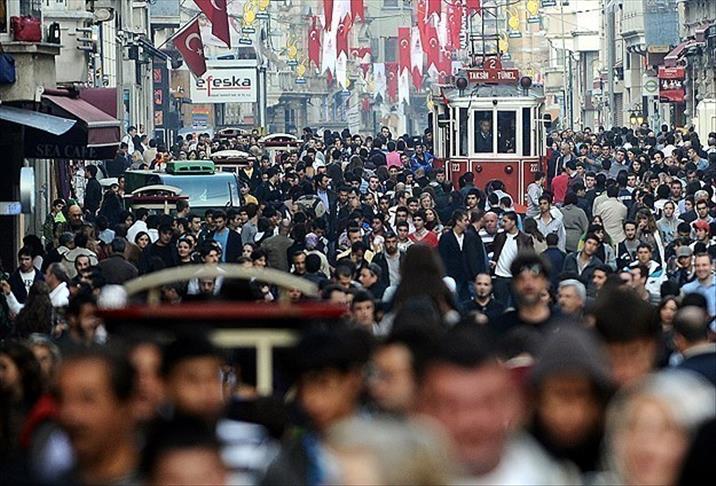
ANKARA
A public opinion research conducted by Turkey's religious affairs body has revealed that 99.2 percent of Turkish population are Muslim while only 0.4 percent of them adopt another or no religion.
Turkish Directorate of Religious Affairs in cooperation with Turkey's official statistical body TurkStat conducted the "Study on Religious Life in Turkey" survey on 21,632 people across the country with the aim of learning the religious tendencies of Turkish citizens and their repercussions on daily life.
All respondents were above 18 years of age and 50.9 percent of them were women.
The results of the survey have revealed that 77.5 percent of the Muslim citizens said they were of Hanafi sect while 11.1 percent were Shafii, 0.1 percent Hanbali and 0.03 percent Maliki -- all four jurisprudential schools within Sunni Islam -- along with 0.1 percent of Shia Jafari sect. 6.3 of them said they adopted no certain sect within Islam.
As to the belief in existence of Allah, 98.7 percent of the respondents said that they "believe and have no doubt that Allah actually exists and that he is the only god." The remaining 0.8 percent responded to the related question with different answers including "I believe in Allah although I have doubts," "It sometimes seems reasonable for me to believe in Allah," "I can't be sure whether or not Allah exists," or "I don't believe in Allah."
96.5 percent said they agreed with the proposition "All told and stated in Islam's holy book Quran is true and has all-time validity."
The proportion of people who believe in resurrection after death and the day of reckoning was 96.2 percent.
95.3 percent expressed that they believed in supernatural beings such as angels, jinns and devils.
Praying habits
The number of people who perform the obligatory 5-time prayer a day corresponded to 42.5 percent -- nearly half of the population -- while 16.9 percent said they never performed any prayer.
The study also shows that praying frequency increases in direct proportion to age, and women pray more frequently than men.
However, the study suggests that the praying frequency generally falls as the level of education rises as 69.3 percent of the illeterate people said they were always performing the 5-time prayer while the figure dropped down to 27.4 among university graduates.
57.4 of men said they always performed the Jumuah (Friday) prayer.
As to the reasons for praying, 92.5 stated that they prayed regardless of reasons. 55.4 percent said they did so when they wanted to offer their gratefulness to Allah.
47.1 percent said they prayed when they were in under material or spiritual stress, while 43 percent said they prayed when they lost one of their loved ones.
Other reasons include making worldly demands and being happy.
Fasting and pilgrimage
The proportion of people who said they fasted in the month of Ramadan as long as their health permitted was 83.4 percent while 2.5 percent said they never fasted. The figure of fasting men in Ramadan was 80.7 percent while it was 86 percent among women.
The study also reveals that 6.6 percent of Turkish people went to Islam's holiest city Mecca in Saudi Arabia and performed their Hajj (pilgrimage) duty.
There is a direct proportion between age and number of people going on pilgrimage. 84.9 percent of the respondents said they did not but wanted to make pilgrimage when they could afford it.
41.9 percent said that they could recite Quran in its original Arabic.
Wearing headscarf
71.6 of women said they wear their headscarves when they go out while 27.2 said they do not.
The figure of headscarf wearing people is 88.9 percent in rural areas while it falls down to 65 in urban areas.
As for the grounds of wearing headscarf, 91.8 percent said they do it as their belief requires while 5.9 do it for traditional reasons, 1.8 upon their families' request and 0.1 under pressure by their community.
Religious knowlegde
Almost all of the respondents expressed that they acquired their religious knowlegde before and at the age of 16.
91.8 percent said the source of this knowledge was their families, inner circle or religious officials while others listed their sources as television, newspapers, Quran courses organized by the Turkish Directorate of Religious Affairs and other formal education institutions.
87.1 percent of the respondents stated that they were raising their children in line with their Islamic sensitivities.
The overall study was published into a book by the state religious affairs authority, with a preface written by its president Mehmet Gormez.
"The study that was conducted in collaboration with TurkStat is actually a serious and qualitative field survey," said Gormez, adding that the outcoming data need to be further analyzed and evaluated in various aspects.
He stressed that the research, aiming to serve as a basis for the religious body for its service planning, provides findings on daily life reflections of Turkish Muslim citizens' habits of performing their religious duties and their level of religious knowledge.
Anadolu Agency website contains only a portion of the news stories offered to subscribers in the AA News Broadcasting System (HAS), and in summarized form. Please contact us for subscription options.

